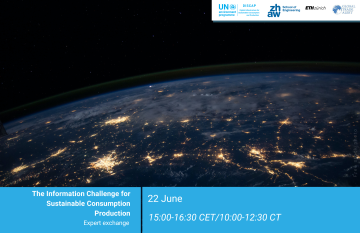
On 22 June 2022 15:00 - 16:30 (CET), the United Nations Environment Programme, ETH Zurich, Global Trade Alert and ZHAW hosted online the latest of a series of stakeholder expert exchanges as part of the project “Digital Infrastructure for Sustainable Consumption and Production” (DISCAP). This meeting was designed as a ‘reality check’, to understand the information problems experienced by stakeholders and the practical challenges building a new transparency mechanism for sustainable consumption and production.
The moderated discussion of multi-stakeholders focused on their pain points in incorporating environmental considerations into value chain operations, investment decisions, consumption, and policy making, in particular the information aspect of the challenge. Particular examples were drawn from the agri-food value chain. This was followed by an exchange of speakers to assess the effectiveness of transparency mechanisms of climate, environment and economic governance and related data ecosystems in tackling those challenges. Recapping expert exchanges of environmental monitoring, value chain traceability and green economy policy transparency that took place in March and April of 2022, the organizers facilitated the participants to translate the information pain into questions of data systems. The participants were encouraged to think beyond the existing centralized transparency mechanisms and elaborate if the rising data solutions in its decentralized form are relevant for the daily information pain of stakeholders.
|
The Information Challenge for Sustainable Consumption and Production
|
|||||||||||||||||
Information pain points:
The meeting revealed a vital gap between the data supply and stakeholder demand for information relating to sustainable consumption and production. In March and April, expert groups with monitoring expertise revealed a rapidly growing body of data, but a low level of uptake. Yet, on June 22nd , stakeholders described a general desire to act on sustainable consumption and production, but a lack of actionable and available data that fits specific decision-making contexts. Some pain points experienced among stakeholder groups are summarized below:
| Start-ups and venture capital (Brandon Day) | Discrepancy in defining terms like ‘sustainable’ and ‘regenerative’; Lack of information available to start-ups; Start-ups tend to prioritize revenue, partners and customers - not sustainability |
| Investors (Vian Sharif) | Much better data available for large, publicly owned businesses than smaller businesses; Different types of data needed for different investments; Lack of transparency over how investors use data |
| Consumers (Oliver Bealby-Wright) | Deliberate and non-deliberate greenwashing; Lack of attention to behavior revealing how consumers process transparency data (e.g. information overload); Information not enough for ‘green premium’ |
| Agri-food value chains (Sener Celik) | Complex ownership of data between farmers and machinery producers; Primary farm data sharing limited due to competitivity |
| Government actors (Simon Evenett) | Inadequate funding means data generation is problem-driven and short-term; Limited data connecting policies with outcomes |
Translating information pain points into questions of data science and transparency mechanism:
In the second half of the session, experts weighed in on the technological and practical challenges associated with addressing the information pain points raised by stakeholders. This exercise was designed to identify key questions for solution-oriented discussions on June 30 th . Four experts (Thomas Streinz, Fulai Sheng, Kurt Stockinger and Simon Evenett) each offered their own interpretations of the challenges, drawing from their experience in their own domains. A key finding was that a multi-disciplinary solution for a transparency mechanism is needed.
- What data is currently not generated, but must be generated?
- Why is generated data not reaching the stakeholders that require this data for sustainable consumption and production?
- When the right data is available for stakeholders, why is it not leading to effective action?
- How can the owners of data be incentivised to share critical data for sustainable consumption and production?
- How can data standards be implemented to ensure data is verifiable and of a high quality?
- From a data science perspective, how can we design a system that connects heterogenous types of data (policy data, environment data, supply chain data) to reveal actionable insights for sustainable consumption and production?
